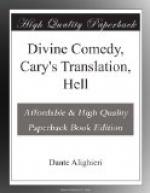“Whence I betook me now grown blind to grope
Over them all, and for three days aloud
Call’d on them who were dead. Then fasting
got
The mastery of grief.” Thus having spoke,
Once more upon the wretched skull his teeth
He fasten’d, like a mastiff’s ’gainst
the bone
Firm and unyielding. Oh thou Pisa! shame
Of all the people, who their dwelling make
In that fair region, where th’ Italian voice
Is heard, since that thy neighbours are so slack
To punish, from their deep foundations rise
Capraia and Gorgona, and dam up
The mouth of Arno, that each soul in thee
May perish in the waters! What if fame
Reported that thy castles were betray’d
By Ugolino, yet no right hadst thou
To stretch his children on the rack. For them,
Brigata, Ugaccione, and the pair
Of gentle ones, of whom my song hath told,
Their tender years, thou modern Thebes! did make
Uncapable of guilt. Onward we pass’d,
Where others skarf’d in rugged folds of ice
Not on their feet were turn’d, but each revers’d.
There very weeping suffers not to weep;
For at their eyes grief seeking passage finds
Impediment, and rolling inward turns
For increase of sharp anguish: the first tears
Hang cluster’d, and like crystal vizors show,
Under the socket brimming all the cup.
Now though the cold had from my face dislodg’d
Each feeling, as ’t were callous, yet me seem’d
Some breath of wind I felt. “Whence cometh
this,”
Said I, “my master? Is not here below
All vapour quench’d?”—“’Thou
shalt be speedily,”
He answer’d, “where thine eye shall tell
thee whence
The cause descrying of this airy shower.”
Then cried out one in the chill crust who mourn’d:
“O souls so cruel! that the farthest post
Hath been assign’d you, from this face remove
The harden’d veil, that I may vent the grief
Impregnate at my heart, some little space
Ere it congeal again!” I thus replied:
“Say who thou wast, if thou wouldst have mine
aid;
And if I extricate thee not, far down
As to the lowest ice may I descend!”
“The friar Alberigo,” answered he,
“Am I, who from the evil garden pluck’d
Its fruitage, and am here repaid, the date
More luscious for my fig.”—“Hah!”
I exclaim’d,
“Art thou too dead!”—“How
in the world aloft
It fareth with my body,” answer’d he,
“I am right ignorant. Such privilege
Hath Ptolomea, that ofttimes the soul
Drops hither, ere by Atropos divorc’d.
And that thou mayst wipe out more willingly
The glazed tear-drops that o’erlay mine eyes,
Know that the soul, that moment she betrays,
As I did, yields her body to a fiend
Who after moves and governs it at will,
Till all its time be rounded; headlong she
Falls to this cistern. And perchance above
Doth yet appear the body of a ghost,
Who here behind me winters. Him thou know’st,
If thou but newly art arriv’d below.
The years are many that have pass’d away,
Since to this fastness Branca Doria came.”




